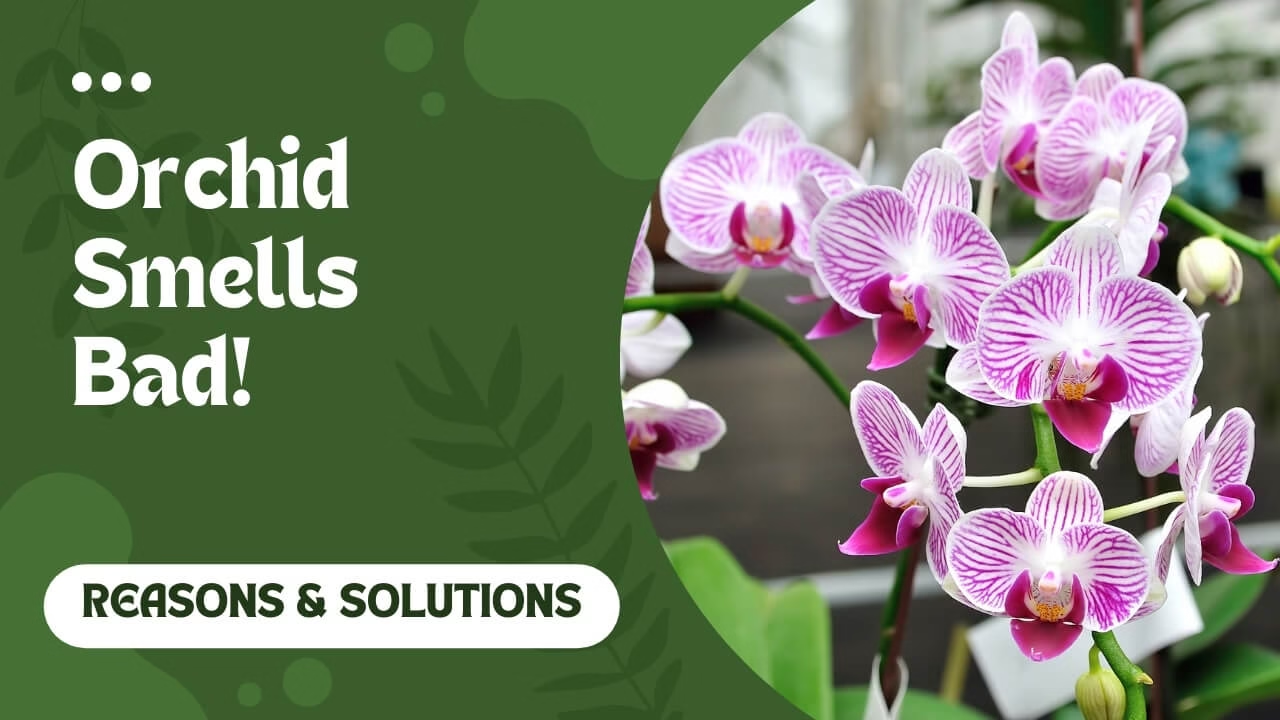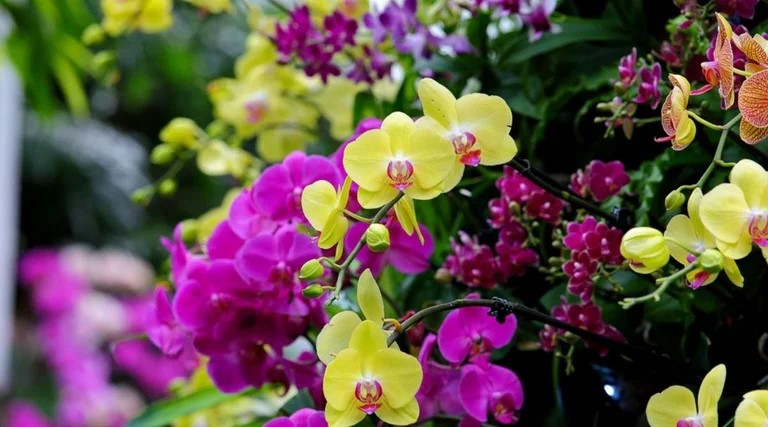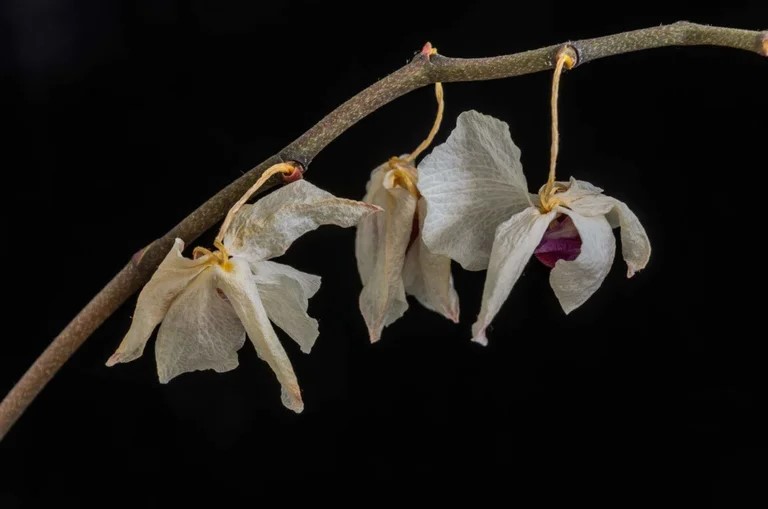
One of the frequently asked questions we get from you is, ‘Why my orchid smells bad?’ Usually, it happens because of their natural pollination strategy, chemical compounds, intensity and perception, environmental factors, and so on.
If you find the scent unappealing, consider enjoying the orchid for its other qualities or opt for a different orchid species known for its pleasant fragrance. Proper care and environmental conditions can help minimize strong odors. For more details, keep reading.
Do Orchid Plants Have Scent?
Yes, some orchid plants do have a scent, while others are scentless. The presence of fragrance in orchids varies greatly between different species and even individual plants within a species.
Orchid scent can range from subtle and delicate to strong and overpowering, depending on the type of orchid. The purpose of these scents varies as well. In nature, some orchids produce fragrances to attract specific pollinators, such as bees, moths, or butterflies.
The scent helps in luring these pollinators, increasing the chances of successful pollination and reproduction for the orchid. It’s important to note that not all orchids produce a strong fragrance that is easily detectable to human noses.
Some orchids may have a very faint scent, while others may have a more pronounced and pleasant aroma. If you’re interested in getting a scented orchid, consider doing some research on the specific orchid species you’re interested in or visiting a nursery where you can experience the scents firsthand.
Keep in mind that environmental factors, such as temperature, humidity, and lighting, can also influence the intensity of an orchid’s fragrance.
Why Does My Orchid Smell Bad? (Explanation)
If your orchid smells bad, it could be due to natural traits, care issues, or environmental conditions. Some orchids are genetically designed to emit strong or odd odors to attract specific pollinators. These scents may resemble spoiled food or decaying matter, which help lure in insects like carrion flies or beetles.
On the other hand, a foul smell might signal a problem with the plant’s health. Root-rot from overwatering, poor drainage, or stale potting mix can cause a sour or musty odor. Fungal or bacterial-infections, especially in humid environments, may also lead to unpleasant smells.
Dead flowers or decaying leaves left on the plant can further worsen the odor. To pinpoint the exact cause, check the roots, inspect the leaves, and look for mold or pests.
Understanding the reason behind the smell will help you take the right steps, whether it’s adjusting care or simply accepting a quirky orchid trait.
Orchid Smells Bad: Quick Guide
So, no more frustration saying my orchid smells bad. Here is a quick overview table on why your orchid smells bad.
| Reasons for Bad Smell | Solutions |
| Natural Pollination Strategy | Appreciate unique characteristics; consider getting a different orchid species known for its pleasant fragrance |
| Chemical Compounds | No direct solution; some scents may be unpleasant to humans but attractive to pollinators |
| Intensity and Perception | Subjective; some individuals may find strong fragrances overpowering |
| Environmental Factors | Adjust temperature, humidity, and lighting to create optimal conditions |
| Hybridization | Accept unique scents inherited from parent species or choose orchids with known pleasant fragrances |
| Watering and Drainage | Ensure proper drainage, water when the top inch of potting medium is dry |
| Air Circulation | Provide adequate airflow without subjecting the orchid to drafts |
| Dead Flowers and Foliage | Remove decaying parts, prune unhealthy sections |
| Repotting | Re-pot if root-rot is suspected or if the plant has been in the same medium for a long time |
| Environmental Conditions | Adjust temperature, humidity, and light to meet specific orchid requirements |
| Orchid Species | Appreciate the unique characteristics of orchids with a bad smell or consider different species with a pleasant fragrance |
| Professional Advice | Consult an experienced orchid grower or horticulturist for personalized guidance |
What Are the Reasons Orchid Smells Bad?
There are a few reasons why some orchids might have a bad smell or emit an unpleasant odor:
Natural Pollination Strategy
Some orchids have evolved to attract specific pollinators, which might be insects or animals that are attracted to decaying matter or foul smells. These orchids often mimic the scent of rotting flesh or dung to attract insects like carrion flies or beetles.
The pollinators are lured to the flower, thinking it is a food source, and in the process of investigating the flower, they inadvertently pick up or deposit pollen, aiding in pollination.
Chemical Compounds
Orchids can produce a wide range of chemical compounds to create their scents. In some cases, these compounds might produce unpleasant odors to us but are attractive to their specific pollinators. The combination of different compounds can lead to a variety of scents, both pleasant and unpleasant.
Intensity and Perception
Some orchids have a very strong fragrance that might be overpowering to certain individuals, leading to the perception of a bad smell. People have different sensitivities to scents, and what one person finds pleasant, another might find unpleasant.
Environmental Factors
The scent of an orchid can also be influenced by environmental factors such as temperature, humidity, and lighting. Changes in these factors can affect the production and release of aromatic compounds in the flowers.
Hybridization
Some cultivated orchid hybrids may inherit genetic traits from their parent species, leading to unexpected or unusual scents that might not be as appealing as those found in wild species.
It’s worth noting that not all orchids have a terrible smell, and many species are renowned for their delightful and pleasing fragrances.
If you’re considering getting an orchid for its scent, you can inquire at a reputable nursery or seek information about specific orchid species known for their pleasant fragrances.
What to Do When Orchid Smells Bad?
If your orchid emits a bad smell, it’s essential to identify the cause and take appropriate action to address the issue. Here are some steps you can take when your orchid smells bad:
Check for Pests and Disorders
A bad smell in an orchid could be an indication of pests. Inspect the plant carefully, including the leaves, flowers, and roots, for any signs of infestation or infection.
Common issues include mold, bacterial or fungal infections, and pest infestations. If you find any problems, treat them promptly following recommended methods for orchid care.
Check Watering and Drainage
Overwatering can lead to root-rot and foul smells. Ensure that your orchid’s pot has proper drainage, and only water when the top inch of the potting medium feels dry to the touch.
Avoid allowing the plant to sit in standing water, as this can also contribute to root problems and bad odors.
Improve Air Circulation
Poor air circulation can lead to stagnant air around the orchid, which may exacerbate any bad smells. Make sure the orchid is in a location with adequate airflow, but avoid placing it in a drafty spot.
Remove Dead Flowers and Foliage
If the bad smell is coming from dead or decaying flowers or foliage, carefully remove them from the plant. Prune any unhealthy parts to prevent further decay and to allow the plant to focus its energy on healthy growth.
Re-pot the Orchid if Necessary
If you suspect root-rot or if the orchid has been in the same potting medium for a long time, it might be time to repot. Gently remove the plant from its current pot, trim any dead or unhealthy orchid roots, and repot it in fresh potting mix for it.
Use a pot that is appropriately sized for the root system, providing enough space for growth and good drainage.
Observe Environmental Conditions
Ensure that your orchid is in an environment suitable for its specific species. Different orchids have varying requirements regarding temperature, humidity, and light. Adjust the conditions as needed to provide the best possible environment for your orchid to thrive.
Consider the Species
As mentioned earlier, some orchids naturally have bad smells as part of their pollination strategy. If you have such an orchid, there may not be much you can do to change its scent.
In this case, you can choose to appreciate its unique characteristics or consider getting a different orchid species known for its pleasant fragrance.
If you’ve tried addressing the potential causes, and the bad smell persists or worsens, it may be beneficial to consult with an experienced orchid grower or a horticulturist who can provide personalized advice based on your specific orchid and its growing conditions.
Best Orchid Species with Pleasant Fragrance
If you’re looking for orchids that not only look beautiful but also smell great, several species are known for their pleasant scent. These fragrant orchids can add a lovely touch to your indoor garden.
Brassavola nodosa, also called “Lady of the Night,” releases a sweet, citrusy scent in the evening. Cattleya orchids are popular for their bright colors and rich, floral fragrance. Oncidium Sharry Baby, often nicknamed the “chocolate orchid,” gives off a delicious scent similar to vanilla or cocoa. Miltoniopsis, or pansy orchids, have a fresh, floral aroma that many people enjoy.
Keep in mind that fragrance can vary depending on factors like temperature, humidity, and time of day. If scent matters to you, consider visiting a nursery to smell different varieties before purchasing. Choosing a fragrant orchid can elevate the sensory experience of your space while still offering the same graceful beauty these plants are known for.
FAQs
How can I identify the cause of the bad smell in my orchid?
To identify the cause, inspect your orchid for signs of pests and disorders. Check the watering and drainage practices, and ensure the potting medium is appropriate.
Observe the environmental conditions, and examine the type of orchid you have to understand its natural scent tendencies.
How can I address bad smells caused by pests and plant-diseases?
If you notice pests or plant-diseases, take immediate action to treat them. Use appropriate pesticides or organic remedies for pests, and apply fungicides or follow cultural practices to combat plant-diseases. Isolate-affected orchids to prevent further spread of the issues.
Can overwatering cause my orchid to smell bad?
Yes, overwatering can lead to root-rot, which produces a foul smell. To avoid this, ensure your orchid has proper drainage and water only when the top inch of the potting medium is dry. Avoid letting the orchid sit in standing water.
borshon96
Recommended

9 Effective Tips for Balcony Gardens for Beginners

Best Homemade Fertilizer: Banana Peel for Plants


Philodendron Neon Heartleaf: Your Most Obedient Houseplant



